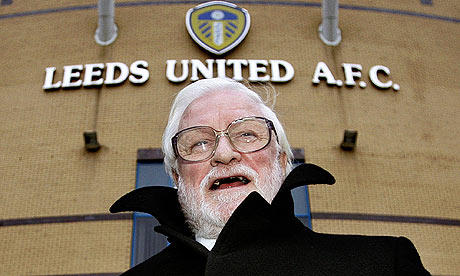The House of Commons select committee on culture media and sport, in its inquiry into football, have repeatedly asked about the Leeds ownership, which is held by three offshore trusts in tax havens administered via Zurich. The select committee clearly decided it is a concern for football supporters not even to know who owns their clubs. Richard Scudamore, the Premier League's chief executive, told the inquiry yesterday that if Simon Grayson's team were to win promotion to the top flight, before Leeds are accepted into the Premier League: "Our rules would require better disclosure of the ownership than is currently the case."
Scudamore appears to have decided Leeds have not revealed enough, and he had a swipe at the Football League's position, which, although a touch patronising, probably hurt. The League did ask Leeds last year to tell them what the ownership arrangements were - Bates, who lives in Monaco, says he has no connection with the owners but they have entrusted him with running the club – but at that point the League did not require its clubs to publish who owns them.
Then in the summer the league introduced the same Premier League rule that clubs must declare publicly who owns 10% or more of the shares. Leeds, on their website, then declared that the ownership is via the three trusts, administered via Zurich, but no individual owns more than 10%. Therefore, the club said, they do not have to name any individuals.
We asked the Football League what evidence Leeds actually supplied them with to satisfy them no individual has more than 10%. The League said we were not entitled to know. Its statement said:
"The statement published by Leeds United outlines that no individual owns more than 10% of the club. The clubs has therefore complied with Football League regulations. Any additional discussions and exchanges of information between Leeds United and the Football League are on a confidential basis, as is the case with all our clubs."
The FA general-secretary Alex Horne told the select committee that a few executives at the FA and Football League know who the owners are, but they will not reveal any detail to the public. So the FA and Football League, which have introduced rules on transparency in recent years, are being made to appear secretive themselves, by the letter of their own rules.
Scudamore, wounded by the Portsmouth wreckage under a helter skelter of four separate owners last year, says the Premier League now goes further, requiring disclosure, and also sources of club funding.
When Bates gave evidence in the libel action brought against him by former Leeds director Melvyn Levi, which Bates lost, the Leeds chairman said he had been "doing business offshore for 30 years". Patrick Murrin, who holds a "management share" in the Swiss ownership vehicle for Leeds, was Bates' accountant in Guernsey, another offshore tax haven, for many years. When Bates was Chelsea's chairman, Murrin was a director, representing a large shareholding, also owned via Guernsey offshore trusts, which was never identified, even after the club was bought by Roman Abramovich in 2003.
Yet times have changed, and the pressure to disclose more fully who owns football clubs - even Leeds United - appears to be gathering pace
 HABERLER & MAKALELER
HABERLER & MAKALELER 


































